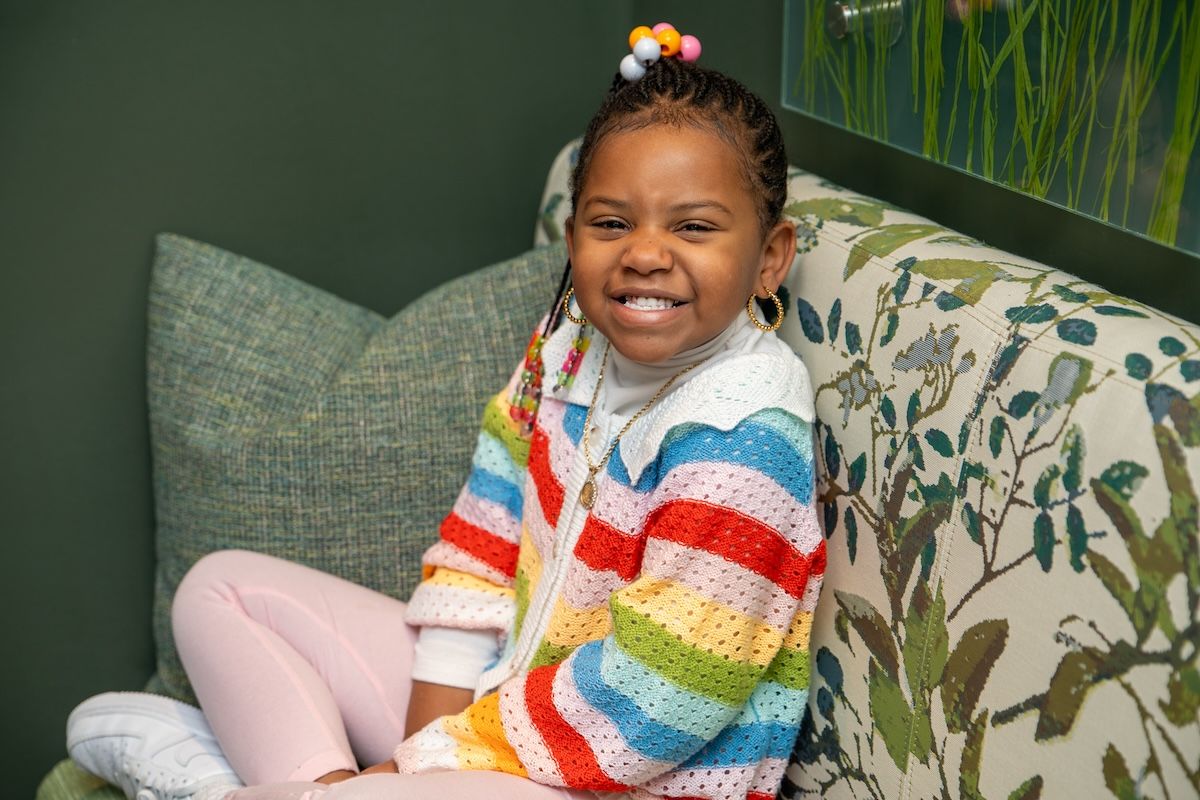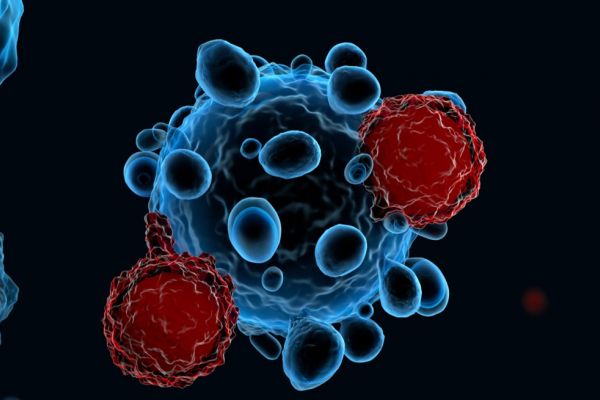After receiving a new cutting-edge cellular therapy as a critically ill baby, this energetic kindergartener now has her family running to keep up.
If you want to match a face to the future of cancer treatment, look no further than the beautiful smile of five-year-old Chasity Mayfield. In 2019, at five months old, Chasity was perhaps the youngest person ever to receive a CAR T-cell immunotherapy that allowed her to beat a rare, aggressive and often fatal form of infantile leukemia.
To her doctors at Roswell Park Oishei Children’s Cancer and Blood Disorders Program, Chasity is a pioneer whose survival offered proof for a lifesaving and curative treatment for cancer. To Chasity’s parents, Shawanda Prather and Cariorl Mayfield, Chasity’s survival is a testament to their religious faith and their trust in the doctors and staff at Roswell Park and Oishei Children’s Hospital.
Now five years old and in kindergarten, Chasity is a happy, healthy, active little girl, who still shows no signs of the cancer that once wracked her body. “She keeps me running all day long,” Shawanda laughs. Chasity is happy to play in the pretend kitchen at her annual clinic visits to Roswell Park and she and her family take part in special Courage of Carly events like Sabres games and Camp Good Days. She loves school, her dog and two cats and playing outside. Her favorite foods are carrots, broccoli, macaroni and cheese, gummies and donuts, but she doesn’t like corn on the cob. “When she grows up, Chasity says she wants to be a dentist and also wants to travel and be on stage one day, probably as a singer,” says Shawanda.
A difficult newborn diagnosis
In late 2018, at just five weeks old, it was almost impossible to imagine a long and healthy future for Chasity. When Chasity was born, her mother noticed red patches on her baby and knew something wasn’t right. Chasity was irritable, vomited frequently and her skin was discolored. “At times she looked gray,” recalls Shawanda. When Chasity arrived at the Oishei Children’s Hospital emergency room, Kara Kelly, MD, Chair of Roswell Park Oishei Children’s Cancer and Blood Disorders Program, happened to be the on-call attending physician. “The normal white blood cell count for an infant is about 10,000, but Chasity’s white blood cell count was over 800,000,” Dr. Kelly explains.
Chasity was quickly diagnosed with acute lymphocytic leukemia, or ALL, the most common form of pediatric cancer. “ALL occurs when bone marrow cells mutate and replicate out of control. Honestly, had Chasity arrived at the hospital any later, she likely would not have survived,” says Dr. Kelly, citing an ALL survival rate at the time of approximately 20% for infants as young as Chasity. Chasity faced even greater odds as a Black infant with aggressive leukemia. A 2018 study in the journal Cancer reported that a Black child with ALL is 43% more likely to die than a white child with the same diagnosis.
Chasity was immediately admitted to Oishei Children’s Hospital and soon began chemotherapy. “It was unbearable to watch our little baby fight through that,” says Shawanda. “Her blood numbers would get better, and then twice she relapsed while recovering from her chemo cycles,” Cariorl recalls. Further tests determined that Chasity’s ALL was caused by a gene mutation that made it less likely to respond to standard chemotherapies and more likely to recur. At that point, Dr. Kelly and pediatric oncology/cellular therapy specialist Meghan Higman, MD, PhD, of Roswell Park and UBMD Pediatrics, talked to Cariorl and Shawanda about using CAR T (short for chimeric antigen receptor) therapy for Chasity.
Advantages of immunotherapy at Roswell Park
We have always been committed to furthering the development of next-generation therapies to bring game-changing treatments to the patients who need them.
A brand new CAR T-cell therapy just in time
The first CAR T-cell therapy, tisagenlecleucel (Kymriah), was approved by the U.S. Food and Drug Administration in 2017 for treatment of some advanced leukemias in both children and adults, and in 2018, Roswell Park was one of the few centers in the country approved to offer this type of therapy. “Dr. Kelly said they felt it was Chasity's best chance for putting cancer in remission, and she’d already proven that she was a strong baby, a real fighter,” says Shawanda.
CAR T-cell therapy is a cutting-edge approach that uses the patient's own T cells (special immune cells that help protect the body from disease). The T cells are collected through a process similar to a blood draw and then genetically modified in a lab to recognize the tumor cells. The treated T cells are multiplied and infused back into the patient to help their immune system find and destroy the cancer cells. “Dr. Higman and Dr. Kelly never pushed us, but they gave us good information about this treatment plan and we put our faith in God and the treatment team and decided to go ahead with it,” says Cariorl.
Two birthdays a year for Chasity
At five months old, Chasity’s own modified T cells were infused back into her, under the care of Dr. Kelly, Dr. Higman, UBMD Pediatrics critical care specialist Bree Kramer, DO, Roswell Park transfusion medicine expert Joanne Becker, MD, and an army of support specialists. Looking back, Chasity’s parents recall their own journey. “There were definitely some scary days and ups and downs but we learned to take it one day at a time, and each day our trust and faith grew,” says Cariorl. “And then one day, everything just turned around. Dr. Kelly said she could see by Chasity’s lab numbers that the leukemia cells were dying, that they were being killed off by the CAR T cells and by the end of the weekend, Chasity was so much better.” Once Chasity’s white blood levels stabilized, she had a stem cell transplant, to decrease the chances that her leukemia would return. She was just seven months old when she got a new immune system thanks to donor cells from her oldest sister, Vataeya, then 14. Chasity now has two birthdays to celebrate each year: October 4, the anniversary of her birth, and July 24, the day she had her stem cell transplant.
A brighter future
Chasity’s medical team believes that she was the youngest patient to successfully complete CAR T therapy followed by a stem cell transplant, with long-term remission from cancer. “We’ve seen the future of oncology in Chasity,” says Dr. Higman. “While Chasity has no memory of what she went through as a baby, we tell her that her scars are her superhero marks and she knows she is special,” says Shawanda. “We now truly believe that our little girl, who arrived at the ER five years ago in critical condition, is cured of cancer and will have a long and happy life.”
As for Cariorl and Shawanda, they too can now allow themselves to envision Chasity’s future. Cariorl sums it up like this: “Instead of always taking it day by day, we can look ahead and think ‘no more nights in the hospital, no more missing our family, no more missing family birthdays, family holidays, family barbecues, no more missing first days of school, no more missing a lot. We can be ‘normal’ parents and look ahead to a happy and healthy future for Chasity.”
Editor’s Note: Cancer patient outcomes and experiences may vary, even for those with the same type of cancer. An individual patient’s story should not be used as a prediction of how another patient will respond to treatment. Roswell Park is transparent about the survival rates of our patients as compared to national standards, and provides this information, when available, within the cancer type sections of this website.



